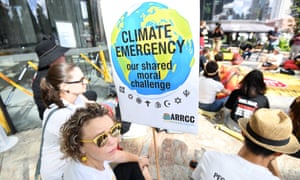Extract from The Guardian
Mark Butler says party will make decision on using carryover credits from the Kyoto protocol after Paris ‘rule book’ established
The shadow climate minister Mark Butler has not ruled out using carryover carbon credits from the Kyoto protocol to help Labor meet its more ambitious emissions reduction targets in the event it wins the next election.
Butler expressed reluctance about using accounting tricks as part of Labor’s climate policy arsenal, but told the ABC he would not make a decision about whether carryover credits were in or out until after the Paris rule book was established.
The use of carryover credits is one of dozens of technical elements being negotiated at the UN climate talks in Katowice, Poland, where 193 countries have gathered to negotiate the “rule book” for each meeting the emissions reductions targets made three years ago in Paris.
The practice of carryover credits allows countries to count carbon credits from exceeding their targets under the soon-to-be-obsolete Kyoto protocol periods against their Paris commitment for 2030.
Preliminary documentation from inside the talks, seen by Guardian
Australia, suggest that using carryover credits is not going to be
prohibited under the rule book for the Paris agreement, meaning
countries will be able – and some likely – to do it.Butler expressed reluctance about using accounting tricks as part of Labor’s climate policy arsenal, but told the ABC he would not make a decision about whether carryover credits were in or out until after the Paris rule book was established.
The use of carryover credits is one of dozens of technical elements being negotiated at the UN climate talks in Katowice, Poland, where 193 countries have gathered to negotiate the “rule book” for each meeting the emissions reductions targets made three years ago in Paris.
The practice of carryover credits allows countries to count carbon credits from exceeding their targets under the soon-to-be-obsolete Kyoto protocol periods against their Paris commitment for 2030.
“I well understand the objections to this idea of carryover and my bias is to steer clear of cop-outs and accounting tricks,” Butler told the ABC on Thursday.
“But we want to look at the final rule book and, in government, get proper advice, not just from government agencies, but talk to climate groups, talk to other stakeholders in the area and make the best decision in the national interest,” he said.
Butler said Labor’s commitment, point to point, was reducing carbon emissions by 45% by 2030.
This week New Zealand’s climate change minister, James Shaw, said the practice of claiming credits was not in the spirit of the Paris agreement, and “we would discourage any country from using [it]”. He has previously described the practice as “dodgy accounting” and like “trying to have two meals for the price of one”.
The Marshall Islands has also raised objections to the use of carryover credits in informal negotiations, but with little support.
The Australian Greens are pressuring Labor to take a definitive position. “Labor needs to immediately rule out using any carryover from Kyoto to meet Australia’s international obligations,” said the Greens climate change spokesman, Adam Bandt.
“If they refuse, they’ll be profiting from climate denialism and making it harder to stop global warming.”
Australia’s environment minister, Melissa Price, who is in Katowice, declined to answer a question from Guardian Australia about whether the government would use carryover credits to meet the Paris targets.
“The government is committed to the Paris agreement,” Price said. “Our priority at COP24 is to secure agreement on a comprehensive rule book to guide the implementation of the agreement.”
She said the government was confident of meeting the emissions reduction target of 26-28% below 2005 levels “based on our track record of meeting and beating our first and second Kyoto protocol targets”.
The Morrison government has dumped an emissions reduction target for electricity, and thus far has not spelled out how it intends to deal with the trend of rising emissions that has been in evidence since the repeal of the carbon price.

No comments:
Post a Comment